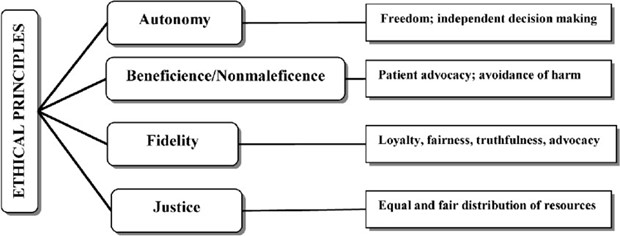A nurse on an inpatient mental health unit is caring for a group of clients. Which of the following actions by the nurse demonstrates the ethical concept of autonomy?
Spending extra time to calm an agitated client
Ensuring that a client understands expectations for group participation
Describing the adverse effects of a client's medications
Importing a client's wishes to refuse prescribed treatments
The Correct Answer is D
Autonomy is the ethical principle that upholds an individual's right to make decisions about their own care and treatment. Respecting autonomy means acknowledging and honoring a person's right to make choices based on their own values, beliefs, and preferences. By importing a client's wishes to refuse prescribed treatments, the nurse is recognizing and respecting the client's autonomy. This shows that the nurse values the client's right to make decisions about their own healthcare and supports their choice, even if it may differ from what the nurse may recommend.
Incorrect:
A. Spending extra time to calm an agitated client demonstrates the ethical principle of beneficence, which is the duty to promote the well-being and welfare of the client.
B. Ensuring that a client understands expectations for group participation relates to the ethical principle of fidelity, which involves maintaining trust and keeping promises to the client.
C. Describing the adverse effects of a client's medications is important for informed consent and promoting understanding, but it does not directly involve the client's autonomy unless it is accompanied by a discussion of the client's choices and preferences regarding medication.

Nursing Test Bank
Naxlex Comprehensive Predictor Exams
Related Questions
Correct Answer is A
Explanation
The response "I will assist you in getting out of bed and getting dressed" demonstrates a supportive and therapeutic approach. It acknowledges the client's current state and offers assistance to engage in self-care activities. By providing support and actively participating in the client's care, the nurse can promote motivation, engagement, and a sense of empowerment.
The response "You can remain in bed until you feel well enough to join the milieu" may enable the client's depressive behaviors and reinforce the avoidance of activities. It does not encourage participation or provide support for the client to engage in therapeutic activities.
The response "The unit rules state that clients may not remain in bed" focuses on enforcing rules rather than addressing the client's underlying emotional state and needs. It may increase resistance and hinder the therapeutic relationship.
The response "If you don't participate in your care, you will not get better" may be perceived as blaming or judgmental. It may increase the client's guilt or sense of failure and does not provide practical support or encouragement.
Correct Answer is D
Explanation
Regression is a defense mechanism that involves reverting to an earlier stage of development or behaving in a way that is characteristic of an earlier developmental level in response to stress or anxiety. It is a way for individuals to cope with overwhelming emotions or situations by retreating to a previous, more comfortable state.
In the scenario described, the client's behavior of consistently being late for appointments and ignoring household chores while expressing the need to be taken care of indicates a regressive response to stress. By relying on others to take care of their responsibilities, the client is seeking a sense of security and support, similar to how they may have relied on others in the past, such as during childhood.
Inc
A- Repression involves the unconscious blocking of unacceptable thoughts or impulses from conscious awareness.
B- Introjection is the internalization of values or qualities of another person or group.
C- Dissociation is a defense mechanism that involves detaching oneself from reality or the present moment to avoid emotional distress.
Whether you are a student looking to ace your exams or a practicing nurse seeking to enhance your expertise , our nursing education contents will empower you with the confidence and competence to make a difference in the lives of patients and become a respected leader in the healthcare field.
Visit Naxlex, invest in your future and unlock endless possibilities with our unparalleled nursing education contents today
Report Wrong Answer on the Current Question
Do you disagree with the answer? If yes, what is your expected answer? Explain.
Kindly be descriptive with the issue you are facing.
